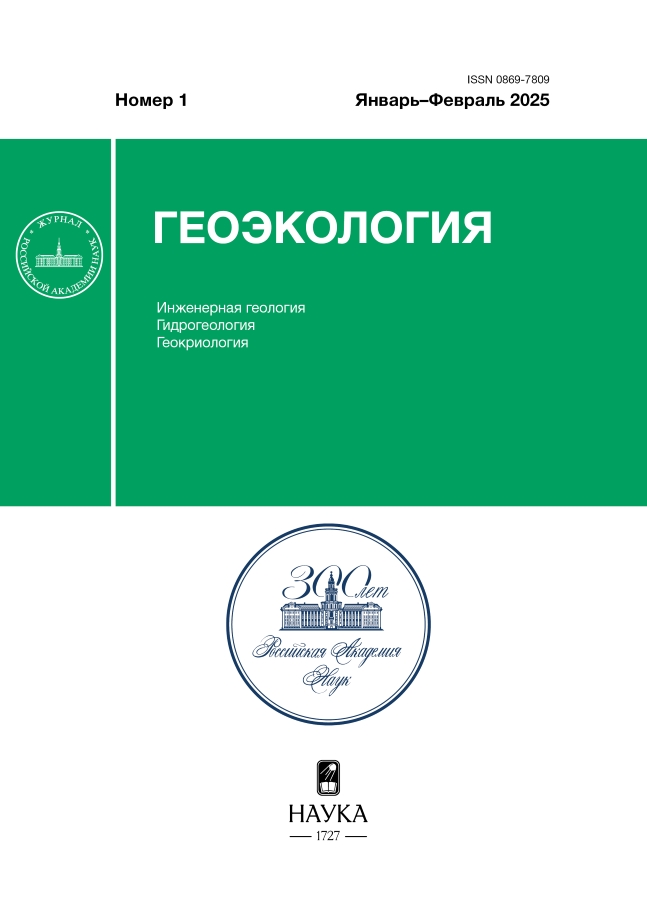Modeling-based geoeсological assessment of the consequences of flooding urban areas in river zones
- Authors: Zaikanov V.G.1, Minakova T.B.1, Buldakova Е.V.1, Savisko I.S.1
-
Affiliations:
- Sergeev Institute of Environmental Geoscience, Russian Academy of Sciences
- Issue: No 1 (2025)
- Pages: 20-26
- Section: NATURAL AND TECHNONATURAL PROCESSES
- URL: https://journals.eco-vector.com/0869-7809/article/view/684712
- DOI: https://doi.org/10.31857/S0869780925010032
- EDN: https://elibrary.ru/DNKQLX
- ID: 684712
Cite item
Abstract
The article discusses an approach to the geoenvironmental assessment of the consequences of flooding urban area upon the Pirogov reservoir dam break. Based on the modeling of flooding, the expected specific damage to geosystems of Korolev city was assessed. The input modeling data included the flow velocity, the time factor, the size of the flooded area, etc., as well as the structure of recipients in each of the selected urban geosystems. The values obtained showed the significance of possible disaster in emergency situations, which confirms the necessity of such an assessment when planning cities in order to prevent undesirable geoenvironmental consequences.
Full Text
About the authors
V. G. Zaikanov
Sergeev Institute of Environmental Geoscience, Russian Academy of Sciences
Author for correspondence.
Email: v.zaikanov@mail.ru
Russian Federation, Moscow
T. B. Minakova
Sergeev Institute of Environmental Geoscience, Russian Academy of Sciences
Email: v.zaikanov@mail.ru
Russian Federation, Moscow
Е. V. Buldakova
Sergeev Institute of Environmental Geoscience, Russian Academy of Sciences
Email: v.zaikanov@mail.ru
Russian Federation, Moscow
I. S. Savisko
Sergeev Institute of Environmental Geoscience, Russian Academy of Sciences
Email: v.zaikanov@mail.ru
Russian Federation, Moscow
References
- Aref’eva, O.N., Bel’chikov, V.A., Borshch, S.V. et al. [Methods of forecasting possible damage from floods (on the example of the Moscow region)]. In: [Natural hazards of Russia. Hydrometeorological hazards]. Moscow, Kruk Publ., 2001, pp. 51–57. (in Russian)
- Buldakova, E.V., Zaikanov, V.G., Minakova, T.B. [Assessment of vulnerability of territories to hazardous natural processes (by the example of flooding)]. Geoekologiya, 2015, no. 5, pp. 434–440. (in Russian)
- Buldakova, E.V., Minakova, T.B. [Principles and criteria for the allocation of urban geosystems in the geoecological assessment of regions]. Geoekologiya, 2013, no. 4, pp. 376–384. (in Russian)
- Malik, L.K. [Risk factors for damage to hydraulic structures. Safety issues]. Moscow, Nauka Publ., 2005, 354 p. (in Russian)
- [Methodology for determining the amount of damage that may be caused to life, human health and property of individuals and legal entities as a result of accidents at hydraulic structures of fuel and energy complex enterprises. Approved. by Order of the Ministry of Emergency Situations of Russia and the Ministry of Energy of Russia dated December 29, 2000, no. 776/508]. Moscow, 2004. (in Russian)
- Prudovskii, A.M. [Formation of a channel during the breakthrough of an earthen dam]. In: [Safety of power structures]. Moscow, NIIES Publ., 1998, iss. 2–3, pp. 67–79. (in Russian)
- Semenov, V.A., Korshunov, A.A. [Floods on the rivers of Russia in the late XX and early XXI centuries]. Voporsy geografii i geoekologii, 2006, iss. 5, pp. 6–12. (in Russian)
Supplementary files













